Climate Data
The Climate Data Guide is a high-traffic expert knowledge portal providing concise and reliable information on the data that are essential for monitoring and understanding the Earth System. Currently, it curates expert insights on over 200 observational datasets and indices, searchable or browseable in the list below.
To find a specific dataset or climate variable, jump to the the search box. For only the datasets paired with guidance written by experts, select the "Datasets with guidance" button when using the search box.
Data creators, data publishers, and scientists who use climate data are invited to join our Network of Experts by contributing commentaries on data strengths and limitations to the Climate Data Guide. What type of data are included? See this discussion.
With the exception of about 25 climate indices, the Climate Data Guide does not host datasets. Data cannot be downloaded from this site. However, links are provided to download locations under the "Data Access" section of each dataset page.
Citation: Please link to this website in your work that draws upon material from this website, and cite this paper:
Schneider, D. P., C. Deser, J. Fasullo, and K. E. Trenberth, 2013: Climate Data Guide Spurs Discovery and Understanding. Eos Trans. AGU, 94, 121–122, https://doi.org/10.1002/2013eo130001.
=> Additionally, each dataset page with expert-written guidance has its own citation example on the individual page, such that the experts who wrote the guidance may be credited. Finally, responsible use and citation of datasets is strongly encouraged.
Climate datasets
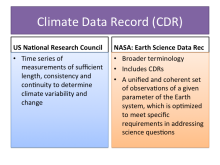 Climate Data Records: Overview
Climate Data Records: Overview
Years of Record
As defined by a US National Research Council committee, a Climate Data Record (CDR) is "a time series of measurements of sufficient length, consistency and continuity to determine climate variability and change." In the US, agencies such as NASA and NOAA have sponsored…
Main variables and Earth System components
-
Formats
-
Timestep
-
Domain
-
Collections
- Climate Data Record
Experts contributing reviews
- None
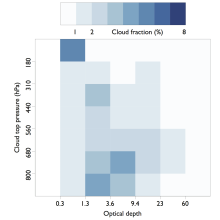 ISCCP: International Satellite Cloud Climatology Project
ISCCP: International Satellite Cloud Climatology Project
Years of Record
- 1983-07 to 2009-12
The International Satellite Cloud Climatology Project (ISCCP) makes use of routine observations by operational weather satellites to provide a long-term (1983-2009), gridded, global record of cloud properties. ISCCP uses observations in the visible and infrared window…
-
Timestep
- Climatology, Sub-daily, Monthly
-
Domain
- Global
Experts contributing reviews
- Pincus, Robert
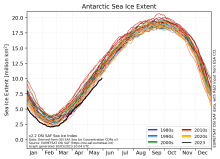 Sea Ice Concentration Climate Data Record from OSI SAF
Sea Ice Concentration Climate Data Record from OSI SAF
Years of Record
- 1978-10 to 2023-08
The Ocean and Sea Ice Satellite Applications Facility (OSI SAF) of EUMETSAT provides sea ice concentration products for the Arctic and Antarctic based on satellite passive microwave data. The concentration value is expressed as the fractional percentage of the ice cover…
-
Formats
- netCDF
-
Timestep
- Daily
-
Collections
- None
Experts contributing reviews
- Aaboe, Signe | Lavergne, Thomas
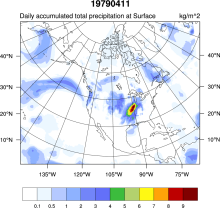 NCEP NARR
NCEP NARR
Years of Record
- 1979-01 to 2022-02
A high resolution (32km x 29 pressure levels) data set focused upon the North American Region. Relative to the NCEP-DOE (R2) it has a much improved land-hydrology, diurnal cycle and land-atmosphere interaction. As such, it can be considered a second generation reanalysis.…
Main variables and Earth System components
Atmosphere Air Temperature Geopotential Height Precipitable water Land-
Formats
- GRIB
-
Timestep
- Climatology, Sub-daily, Monthly
-
Domain
- North America
-
Collections
- None
Experts contributing reviews
- None
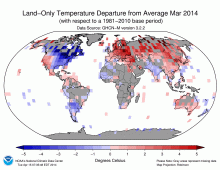 GHCN (Global Historical Climatology Network) Related Gridded Products
GHCN (Global Historical Climatology Network) Related Gridded Products
Years of Record
- 1870-01 to 2014-05
Long time series of gridded surface temperature and precipitation data derived from homongenized station data. The gridded anomalies were produced from GHCN-M bias corrected data. GHCN data and CAMS (Climate Anomaly Monitoring System) are combined to produce a high…
Main variables and Earth System components
Experts contributing reviews
- None
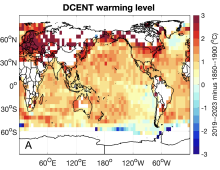 Global surface temperature data: The Dynamically Consistent ENsemble of Temperature (DCENT)
Global surface temperature data: The Dynamically Consistent ENsemble of Temperature (DCENT)
Years of Record
- 1850 to Present
The Dynamically Consistent ENsemble of Temperature (DCENT) provides monthly, global, gridded, surface temperature anomalies since 1850. This product provides combined land surface air temperature (LSAT) and sea surface temperature (SST) anomalies at monthly 5° x 5°…
Main variables and Earth System components
Atmosphere Air Temperature at 2m Ocean SST - sea surface temperatureExperts contributing reviews
- Chan, Duo
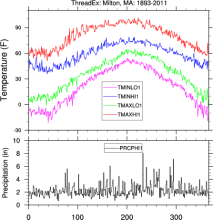 NOAA ThreadEx Long-term Station Extremes for America
NOAA ThreadEx Long-term Station Extremes for America
Years of Record
- 1870-01 to 2011-12
ThreadEx is a data set of extreme daily temperature and precipitation values for 270 locations in the United States. For each day of the year at each station, ThreadEx provides the top 3 record high and low daily maximum temperatures, the top 3 record high and low daily…
Main variables and Earth System components
Atmosphere Air Temperature Maximum Air Temperature Minimum Air Temperature Precipitation-
Formats
- ascii
-
Timestep
- Daily
-
Domain
- North America
-
Collections
- None
Experts contributing reviews
- None
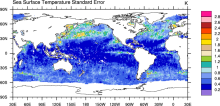 SST (AMSR-E): Sea Surface Temperature from Remote Sensing Systems
SST (AMSR-E): Sea Surface Temperature from Remote Sensing Systems
Years of Record
- 2002-06 to 2010-12
High resolution (0.25°) SSTs were derived from the AMSR-E, a passive microwave radiometer flying on NASA's AQUA satellite. Remote Sensing Systems distributes the data in high spatial and temporal (daily, weekly, monthly) resolutions for both daytime and nighttime averages…
Experts contributing reviews
- None
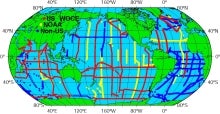 GLODAP: GLobal Ocean Data Analysis Project for Carbon
GLODAP: GLobal Ocean Data Analysis Project for Carbon
Years of Record
The GLobal Ocean Data Analysis Project (GLODAP) is a cooperative effort to coordinate global synthesis projects funded through the National Oceanic and Atmospheric Administration (NOAA), the U.S. Department of Energy (DOE), and the National Science Foundation (NSF) as…
-
Timestep
- Climatology
-
Domain
- Global
-
Collections
- Carbon cycle
Experts contributing reviews
- None
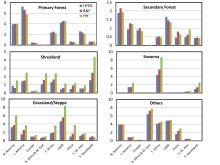 Historical land-cover changes and land-use conversions global data set by Meiyappan and Jain
Historical land-cover changes and land-use conversions global data set by Meiyappan and Jain
Years of Record
- 1800-01 to 2010-12
A set of three estimates of land-cover types and annual transformations of land use are provided on a global 0.5°x0.5° grid at annual timesteps. The longest of the three estimates spans 1770-2010. The three estimates use three different data sets of cropland and…
Main variables and Earth System components
Land Land Cover Type Land Use Conversion Vegetation CoverExperts contributing reviews
- Meiyappan, Prasanth
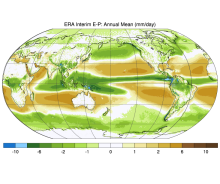 ERA-Interim: derived components
ERA-Interim: derived components
Years of Record
- 1979-01 to 2015-12
Era-Interim data are used to derive monthly mass, moisture and energy budget products. Each term is available. Atmospheric energy, mass, and moisture budgets can be computed by vertically integrating reanalysis fields and employing suitable corrections (e.g. mass). The…
-
Formats
- netCDF
-
Timestep
- Monthly
-
Domain
- Global
-
Collections
- Climate Analysis Section (CAS) Data Catalog
Experts contributing reviews
- None
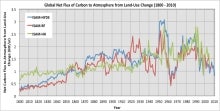 Carbon Emissions from Historical Land-Use and Land-Use Change
Carbon Emissions from Historical Land-Use and Land-Use Change
Years of Record
- 1800-01 to 2012-09
Annual net land-atmosphere carbon flux and net flux of carbon to the atmosphere due to land-use and land-use change (LULUC) are estimated using an integrated assessment model and three historical reconstructions of land use and land use conversion. The data span 1800-2010…
Main variables and Earth System components
Biosphere CO2 Land CO2 Land-Atmosphere flux Land Cover Type Land Use ConversionExperts contributing reviews
- Meiyappan, Prasanth
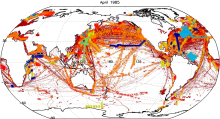 HadIOD: Met Office-Hadley Centre Integrated Ocean Database
HadIOD: Met Office-Hadley Centre Integrated Ocean Database
Years of Record
- 1850-01 to 2019-12
HadIOD (Met Office Hadley Centre Integrated Ocean Database) is a global database of in situ ocean temperature and salinity observations, spanning 1850-present on a daily timestep. It is somewhat unique among temperature and salinity datasets in that it combines…
Main variables and Earth System components
Ocean Salinity SST - sea surface temperature Sub Surface TemperatureExperts contributing reviews
- Atkinson, Chris
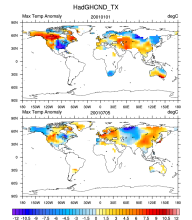 HadGHCNDEX - Gridded Daily Temperature Extremes
HadGHCNDEX - Gridded Daily Temperature Extremes
Years of Record
- 1950-01 to 2011-12
HadGHCND (aka HadGHCNDEX) is a gridded daily dataset of near-surface maximum (TX) and minimum (TN) temperature observations. Anomalies (departures from 1961-1990 climatology) and actual temperatures are distributed in two separate files. The dataset is designed primarily…
Main variables and Earth System components
Atmosphere Maximum Air Temperature Minimum Air TemperatureExperts contributing reviews
- None
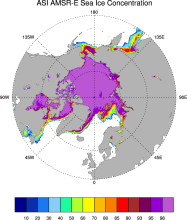 Sea Ice Concentration data from AMSR-E, AMSR2 & SSMIS, U Bremen and U Hamburg ASI algorithm
Sea Ice Concentration data from AMSR-E, AMSR2 & SSMIS, U Bremen and U Hamburg ASI algorithm
Years of Record
- 2002-06 to 2011-10
The sea ice data derived from AMSR-E using the ARTIST sea ice (ASI) algorithm offer a factor of 4 finer spatial resolution than most sea ice data sets from passive microwave satellite instruments. ASI is based on the difference of vertically and horizontally polarized…
-
Timestep
- Daily
-
Collections
- None
Experts contributing reviews
- None
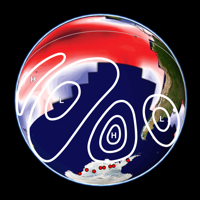 Kaplan Sea Surface Temperature Anomalies
Kaplan Sea Surface Temperature Anomalies
Years of Record
- 1856-01 to 2020-03
The most up-to-date version is known as Kaplan Extended SST v2, which combines statistically infilled grids of UK Met Office SSTs for 1856-1981 with a statistically reduced and coarser resolution version of Smith and Reynolds Optimally Interpolated (OI) SSTs for 1981 to…
Experts contributing reviews
- Kaplan, Alexy
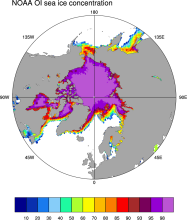 Sea Ice Concentration data from NOAA OI
Sea Ice Concentration data from NOAA OI
Years of Record
- 1981-10 to 2022-02
The NOAA Optimal Interpolation (OI) v2 sea ice data set contains gridded, weekly or monthly resolution sea ice concentration estimates for both the Northern and Southern Hemispheres. It is intended as a consistent analyses for input into SST analyses (and is the basis for…
-
Formats
- netCDF
-
Timestep
- Monthly, Weekly
-
Collections
- Boundary Conditions
Experts contributing reviews
- None
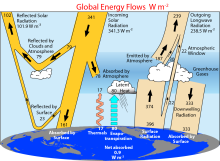 Budgets: Mass, Moisture, Energy
Budgets: Mass, Moisture, Energy
Years of Record
The uneven distribution of incoming and outgoing radiation is the primary driver of the climate system. The resulting flows of energy by the climate components (atmosphere, ocean, ice, etc) determine the climate. Ultimately, the net difference between incoming and…
Main variables and Earth System components
Atmosphere Budget Evaporation Evaporation-Precipitation Radiation-
Formats
-
Timestep
-
Domain
-
Collections
- Climate Analysis Section (CAS) Data Catalog
Experts contributing reviews
- None
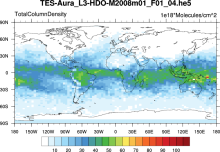 Water Isotopes from Satellites
Water Isotopes from Satellites
Years of Record
- 2000-01 to 2012-09
Summary of 7 satellite-derived products providing a global snapshot of water isotope distribution in 3D, with good information on zonal gradients and seasonality.
Experts contributing reviews
- Risi, Camille
 Ocean heat content for 10-1500m depth based on Argo
Ocean heat content for 10-1500m depth based on Argo
Years of Record
- 2005-01 to 2011-12
A regularly updated monthly timeseries of ocean heat content, based on Argo profiles, is integrated over 10-1500m depth and the latitudes 60°S-60°N. Coverage begins in 2005. It is estimated based on the method described in von Schuckmann and Le Traon (2011) and discussed…
Experts contributing reviews
- von Schuckmann, Karina
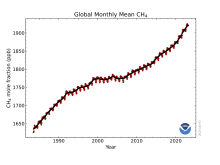 Global-mean methane at the Earth's surface from NOAA’s global cooperative greenhouse gas measurements
Global-mean methane at the Earth's surface from NOAA’s global cooperative greenhouse gas measurements
Years of Record
- 1983-01 to 2023-05
NOAA’s Global Monitory Laboratory has measured atmospheric methane levels since 1983 at a global cooperative greenhouse gases sampling network, which currently includes more than 50 sites. This measurement network is unique among greenhouse gases monitoring programs with…
Experts contributing reviews
- Lan, Xin
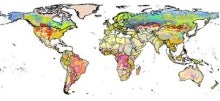 Harmonized Soil Carbon Database
Harmonized Soil Carbon Database
Years of Record
"This state-of-the-art database was established by IIASA and FAO in partnership with: ISRIC-World Soil Information which, together with the FAO, contributed recent regional soil and terrain databases together with the WISE soil profile database; The European Soil Bureau…
-
Formats
- netCDF | ARC/INFO ASCII GRID
-
Timestep
-
Domain
- Global
-
Collections
- Carbon cycle
Experts contributing reviews
- None
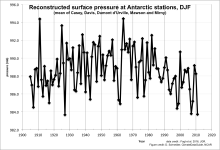 Antarctic Seasonal Pressure Reconstructions 1905-2013
Antarctic Seasonal Pressure Reconstructions 1905-2013
Years of Record
- 1905-01 to 2013-12
This dataset consists of seasonally resolved timeseries of surface pressure at 18 Antarctic research stations, spanning 1905-2013. Routine meteorological observations began at most of these stations only around 1960, leaving a very short instrumental record on which…
-
Formats
- ascii | Spreadsheet
-
Timestep
- Seasonal
-
Domain
- Antarctic
-
Collections
- None
Experts contributing reviews
- None
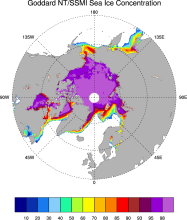 Sea Ice Concentration data from NASA Goddard and NSIDC based on NASA Team algorithm
Sea Ice Concentration data from NASA Goddard and NSIDC based on NASA Team algorithm
Years of Record
- 1978-10 to 2014-12
NASA Team sea ice refers to a well-known algorithm used to estimate sea ice concentration from passive microwave brightness temperatures. This page discusses the algorithm itself and the long-term data set ("NSIDC 0051") produced by scientists at NASA Goddard and…
-
Timestep
- Daily, Monthly
-
Collections
- Diagnostic Data Sets, NCAR-DOE-CESM, seaicediagnostics
Experts contributing reviews
- None
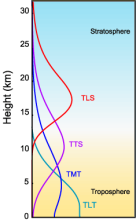 MSU/AMSU Atmospheric Temperature Climate Data Record, Remote Sensing Systems (RSS)
MSU/AMSU Atmospheric Temperature Climate Data Record, Remote Sensing Systems (RSS)
Years of Record
- 1979-01 to 2012-12
A long (30-year+) data set of atmospheric temperatures for 4 tropopsheric and lower stratopsheric layers has been derived from brightness temperatures measured by the Microwave Sounding Unit (MSU) and Advanced Microwave Sounding Unit (AMSU). This page describes the data…
-
Timestep
- Monthly
-
Domain
- Global
-
Collections
- Climate Data Record
Experts contributing reviews
- Mears, Carl
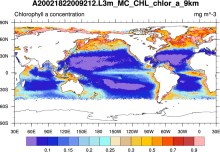 SeaWIFS: ocean bio-optical and carbon properties
SeaWIFS: ocean bio-optical and carbon properties
Years of Record
- 2002-01 to 2013-08
The purpose of the Sea-viewing Wide Field-of-view Sensor (SeaWiFS) Project is to provide quantitative data on global ocean bio-optical properties and to assess the oceans' role in the global carbon cycle. SeaWiFS data are being used to help clarify the magnitude and…
-
Formats
- HDF
-
Timestep
- Climatology, Daily, Monthly, Seasonal, Annual
-
Domain
- Global
-
Collections
- Carbon cycle
Experts contributing reviews
- None
 Walsh and Chapman Northern Hemisphere Sea Ice
Walsh and Chapman Northern Hemisphere Sea Ice
Years of Record
- 1870-01 to 2011-12
The Walsh and Chapman Sea Ice Data Set provides a long record of Arctic sea ice concentrations on a monthly basis for 1870-2011. Historical observations were gridded and combined with satellite-derived sea ice concentrations for the recent decades. Mostly climatologies…
-
Formats
- ascii
-
Timestep
- Monthly
-
Domain
- NH - Northern Hemisphere, Arctic
-
Collections
- None
Experts contributing reviews
- Chapman, William
 Randolph Glacier Inventory data base of global glacier outlines
Randolph Glacier Inventory data base of global glacier outlines
Years of Record
The Randolph Glacier Inventory (RGI) is a global data base of glacier outlines. It is intended for estimates of ice volume and glacier mass at regional and global scales. The data are organized into 19 large regions, with a shapefile provided for each region. The RGI is…
Experts contributing reviews
- None
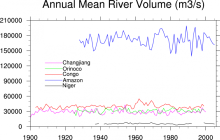 Freshwater Discharge: 1948-2004
Freshwater Discharge: 1948-2004
Years of Record
- 1948-01 to 2004-12
"A dataset of historical monthly streamflow at the farthest downstream stations for the world’s 925 largest ocean-reaching rivers has been created for community use. Compared with previous studies, the new dataset has improved homogeneity and enables more reliable…
-
Timestep
- Monthly
-
Domain
- Global
-
Collections
- Climate Analysis Section (CAS) Data Catalog
Experts contributing reviews
- None
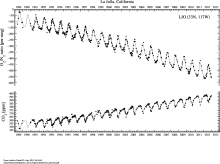 SCRIPPS O2 ,CO2 and APO
SCRIPPS O2 ,CO2 and APO
Years of Record
- 1989-01 to 2012-12
"The Scripps O2Program measures changes in atmospheric oxygen levels from air samples collected at stations around the world. This sampling network provides a global and hemispheric perspective on oxygen variability. " Stations include: Alert, NWT, Canada Cold Bay,…
-
Formats
- ascii
-
Timestep
- Daily, Monthly
-
Domain
-
Collections
- Carbon cycle
Experts contributing reviews
- None
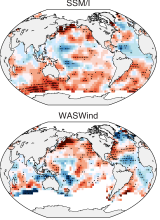 WASWind: Wave and Anemometer-based Sea Surface Wind
WASWind: Wave and Anemometer-based Sea Surface Wind
Years of Record
- 1950-01 to 2011-12
"WASWind (Wave and Anemometer-based Sea Surface Wind) provides a bias-corrected marine surface wind dataset over the global oceans. Variables include scalar, zonal and meridional winds at 10-meter high, and zonal and meridional components of wind stress. WASWind has been…
Experts contributing reviews
- Tokinaga, Hiroki
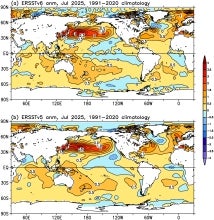 SST Data: NOAA Extended Reconstruction SSTs Version 6 (ERSSTv6)
SST Data: NOAA Extended Reconstruction SSTs Version 6 (ERSSTv6)
Years of Record
- 1850-01 to 2025-01
The NOAA Extended Reconstruction Sea Surface Temperature version 6 (ERSSTv6) is a global, spatially complete SST data at monthly 2°×2° resolutions based on in situ observations for 1850-present. Version 6 is based upon statistical interpolation of the ICOADS release 3.0.2…
Experts contributing reviews
- Huang, Boyin | Yin, Xungang
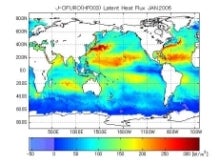 Japanese Ocean Flux Data sets with Use of Remote Sensing Observations (J-OFURO2)
Japanese Ocean Flux Data sets with Use of Remote Sensing Observations (J-OFURO2)
Years of Record
- 1988-01 to 2006-12
These ocean surface flux data sets are derived primarily using data from multiple satellites. The COARE 3.0 bulk algorithm [Fairall et al. (2003)] is used in J-OFURO2 for the estimation of sensible and latent heat fluxes.
Main variables and Earth System components
Atmosphere Specific Humidity Wind Stress Latent & sensible heat flux Ocean Surface FluxExperts contributing reviews
- None
 Extended Edited Synoptic Cloud Reports Archive (EECRA) from Ships and Land Stations Over the Globe
Extended Edited Synoptic Cloud Reports Archive (EECRA) from Ships and Land Stations Over the Globe
Years of Record
- 1952-01 to 2008-12
"The Extended Edited Synoptic Cloud Reports Archive makes use of routine synoptic observations made by humans on ships over the ocean and at weather stations over land. Following the synoptic code (WMO, 1974), observers report the fraction of sky dome covered by all…
Experts contributing reviews
- Norris, Joel
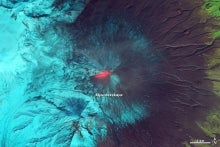 LANDSAT
LANDSAT
Years of Record
- 1972-01 to 2013-09
"The Landsat Program provides the longest continuous space-based record of Earth’s land in existence. Since 1972, Landsat satellites have collected measurements of Earth’s continents and surrounding coastal regions that have enabled people to study forests, food…
Main variables and Earth System components
Biosphere NPP: Net Primary Production Land Land Cover Type Vegetation Cover-
Formats
-
Timestep
- Sub-daily
-
Domain
- Global
-
Collections
- Carbon cycle
Experts contributing reviews
- None
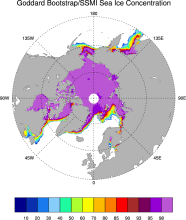 Sea Ice Concentration data from NASA Goddard and NSIDC based on Bootstrap algorithm
Sea Ice Concentration data from NASA Goddard and NSIDC based on Bootstrap algorithm
Years of Record
- 1978-10 to 2014-12
Bootstrap sea ice refers to a well-known algorithm used to estimate sea ice concentration from passive microwave brightness temperatures. It can be applied to data from many satellite instruments, such as SMMR, SSMI, and AMSR-E. This page discusses the algorithm itself and…
-
Timestep
- Daily, Monthly
-
Collections
- None
Experts contributing reviews
- None
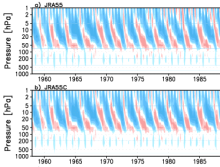 JRA-55C (reanalysis using conventional observations)
JRA-55C (reanalysis using conventional observations)
Years of Record
- 1972-10 to 2013-01
JRA-55C is a fixed observing system atmospheric reanalysis that uses the same model and data assimilation scheme as JRA-55. The observations assimilated include surface station data, radiosondes, tropical cyclone retrievals and wind profilers. No satellite…
Main variables and Earth System components
Experts contributing reviews
- Kobayashi, Chiaki
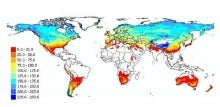 Landscape surface freeze/thaw status based on passive microwave remote sensing
Landscape surface freeze/thaw status based on passive microwave remote sensing
Years of Record
- 1979-01 to 2011-09
A global data set of the frozen state of the land surface (free-thaw (FT) status) has been developed spanning 1979-present at a daily timestep and 25 x 25 km spatial resolution. Based on passive microwave remote sensing, the FT parameter is closely related to the surface…
-
Timestep
- Daily
-
Domain
- Global
-
Collections
- Climate Data Record
Experts contributing reviews
- Kimball, John
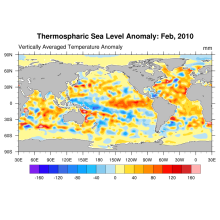 Global Ocean Heat and Thermospheric Sea Level Change
Global Ocean Heat and Thermospheric Sea Level Change
Years of Record
- 1955-01 to 2010-12
Using updated data from the World Ocean Database (Boyer et al, 2009) and improved ARGO profiling data, new estimates of ocean heat content and thermospheric sea level change (0-2000m) for the period 1955-2010 are derived.
Experts contributing reviews
- None
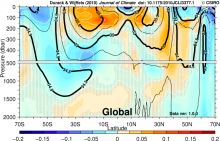 Global Ocean Salinity Change, 1950-2008 (Durack-Wijffels)
Global Ocean Salinity Change, 1950-2008 (Durack-Wijffels)
Years of Record
- 1950-01 to 2009-04
Using data from the Indian Ocean Hydrobase (IOHB) (Kobayashi et al., 2006), Hydrobase2 (Curry, 2002), and Southern Ocean Atlas (Orsi and Whitworth, 2010) databases along with the improved spatial and temporal coverage provided by ARGO profiling data, new estimates of…
Main variables and Earth System components
Experts contributing reviews
- None
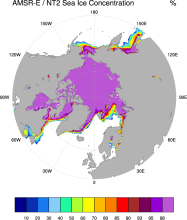 Sea Ice Concentration data from NASA Goddard and NSIDC using AMSR-E and NASA TEAM2 (NT2) algorithm
Sea Ice Concentration data from NASA Goddard and NSIDC using AMSR-E and NASA TEAM2 (NT2) algorithm
Years of Record
- 2002-06 to 2011-10
The AMSR-E/NASA Team 2 (NT2) data set of Arctic and Antarctic sea ice concentration is available at daily timesteps and 12.5 km (optionally 25km) spatial resolution for 2002-2011. NT2, an extension of the original NASA Team algorithm, uses AMSR-E 89GHz channels to help…
Experts contributing reviews
- None
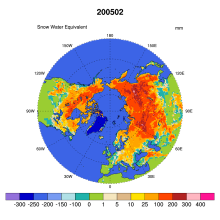 Global Monthly EASE-Grid Snow Water Equivalent Climatology: SSMR, SSMI
Global Monthly EASE-Grid Snow Water Equivalent Climatology: SSMR, SSMI
Years of Record
- 1978-11 to 2007-05
This data set comprises global, monthly satellite-derived snow water equivalent (SWE) climatologies from November 1978 through May 2007, and is updated with more recent data periodically. Global data are gridded to the Northern and Southern 25 km Equal-Area Scalable Earth…
-
Formats
- binary
-
Timestep
- Monthly
-
Collections
- None
Experts contributing reviews
- None
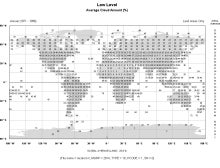 Gridded Climatology of Clouds from Surface Observations Worldwide (1971-2008)
Gridded Climatology of Clouds from Surface Observations Worldwide (1971-2008)
Years of Record
- 1954-01 to 2009-12
This digital archive provides multi-year monthly, seasonal, and annual averages in 5x5-degree grid boxes (or 10x10-degree boxes for some quantities over the ocean). Daytime and nighttime averages, as well as the diurnal average (average of day and night), are given.…
-
Formats
- ascii
-
Timestep
- Climatology, Monthly, Seasonal
-
Domain
- Global
-
Collections
- Diagnostic Data Sets, NCAR-DOE-CESM, atmosdiagnostics
Experts contributing reviews
- Norris, Joel
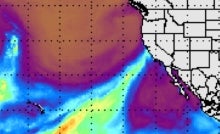 Atmospheric Rivers: The Atmospheric River Tracking Method Intercomparison Project (ARTMIP)
Atmospheric Rivers: The Atmospheric River Tracking Method Intercomparison Project (ARTMIP)
Years of Record
- 1980-01 to 2017-06
ARTMIP is the Atmospheric River Tracking Method Intercomparison Project. The goal of ARTMIP is to provide the community with the data necessary to quantify Atmospheric River (AR) uncertainty due to how ARs are defined or identified in gridded datasets. Atmospheric rivers…
Main variables and Earth System components
AtmosphereExperts contributing reviews
- None
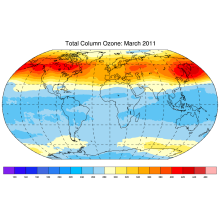 Total Column Ozone: Bodeker Scientific
Total Column Ozone: Bodeker Scientific
Years of Record
Bodeker Scientific produces global, daily, total column ozone database by combining measurements from a number of different satellite-based instruments. Offsets and drifts between the different datasets are resolved through comparisons with the Dobson and Brewer ground-…
Experts contributing reviews
- None
 Global surface temperature: Maximum Likelihood Estimates of Temperatures using HadCRUT5 (Version 1.2)
Global surface temperature: Maximum Likelihood Estimates of Temperatures using HadCRUT5 (Version 1.2)
Years of Record
- 1850-01 to 2023-12
The Maximum Likelihood Estimates of Temperatures using HadCRUT5 Version 1.2 (HadCRU_MLE_v1.2) dataset provides global complete surface temperature estimates since 1850, with monthly 5°x5° resolution. It uses more sophisticated statistical models to fill data gaps in…
Main variables and Earth System components
Atmosphere Air Temperature at 2m Ocean SST - sea surface temperatureExperts contributing reviews
- Chan, Duo
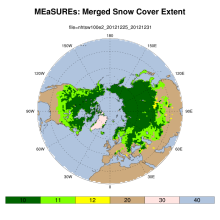 MEaSUREs: Northern Hemisphere Terrestrial Snow Cover Extent Weekly 100km EASE-Grid 2.0
MEaSUREs: Northern Hemisphere Terrestrial Snow Cover Extent Weekly 100km EASE-Grid 2.0
Years of Record
- 1966-10 to 2012-12
"This data set offers users weekly 100 km Northern Hemisphere snow cover extent represented by three different variables. Two of the variables are derived from individual source products: the NOAA/NCDC Northern Hemisphere Snow Cover Extent Climate Data Record and Defense…
-
Formats
- netCDF
-
Timestep
- Weekly
-
Domain
- NH - Northern Hemisphere
-
Collections
- Climate Data Record
Experts contributing reviews
- None
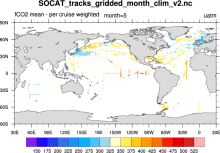 SOCAT: Surface Ocean CO2 Atlas
SOCAT: Surface Ocean CO2 Atlas
Years of Record
- 1970-01 to 2007-12
SOCAT (Surface Ocean CO2 Atlas) represents an effort to "provide a comprehensive, publicly available, regularly updated, global data set of marine surface CO2, which had been subject to quality control (QC)." The data sets are comprised of observations (ship track)…
-
Formats
- netCDF
-
Timestep
- Climatology, Monthly, Annual
-
Domain
- Global
-
Collections
- Carbon cycle
Experts contributing reviews
- None
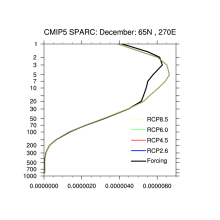 Stratospheric & Tropospheric Ozone: ACC/SPARC (Atmospheric Chemistry and Climate / Stratospheric Processes and their Role in Climate)
Stratospheric & Tropospheric Ozone: ACC/SPARC (Atmospheric Chemistry and Climate / Stratospheric Processes and their Role in Climate)
Years of Record
- 1850-01 to 2099-12
"The AC&C/SPARC ozone database covers the period 1850 to 2100 and can be used as forcing in climate models that do not include interactive chemistry. The historical part of the AC&C/SPARC ozone database spans the period 1850 to 2009 and consists of separate…
-
Formats
- netCDF
-
Timestep
- Monthly
-
Domain
- Global
-
Collections
- Boundary Conditions, CMIP5-recommended, AC&C/SPARC ozone
Experts contributing reviews
- None
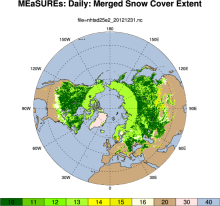 MEaSUREs Northern Hemisphere Terrestrial Snow Cover Extent Daily 25km EASE-Grid 2.0
MEaSUREs Northern Hemisphere Terrestrial Snow Cover Extent Daily 25km EASE-Grid 2.0
Years of Record
- 1999-01 to 2012-01
"This data set offers users 25 km Northern Hemisphere snow cover extent represented by four different variables. Three of the snow cover variables are derived from the Interactive Multisensor Snow and Ice Mapping System, MODIS Cloud Gap Filled Snow Cover, and passive…
-
Formats
- netCDF
-
Timestep
- Daily
-
Domain
- NH - Northern Hemisphere
-
Collections
- None
Experts contributing reviews
- None